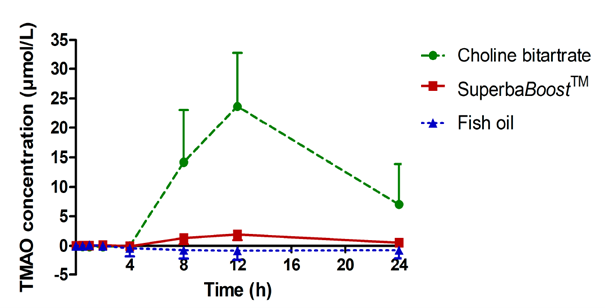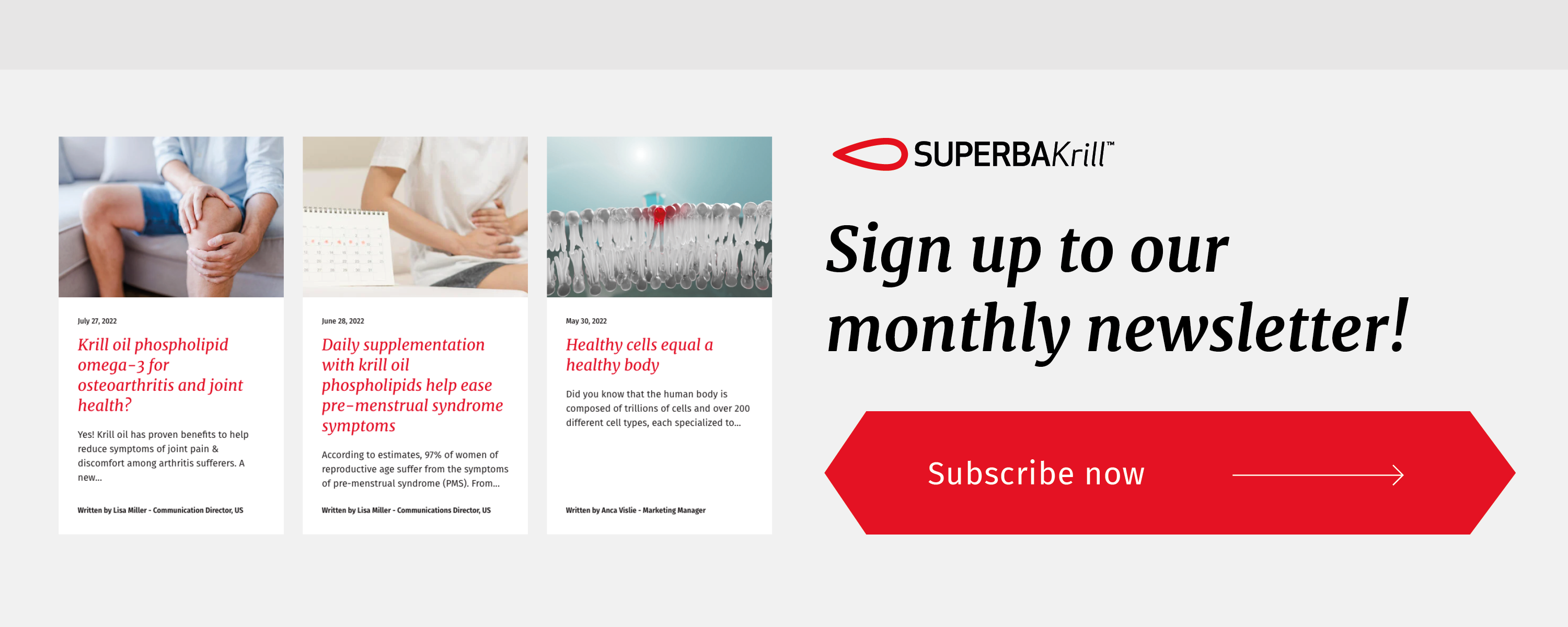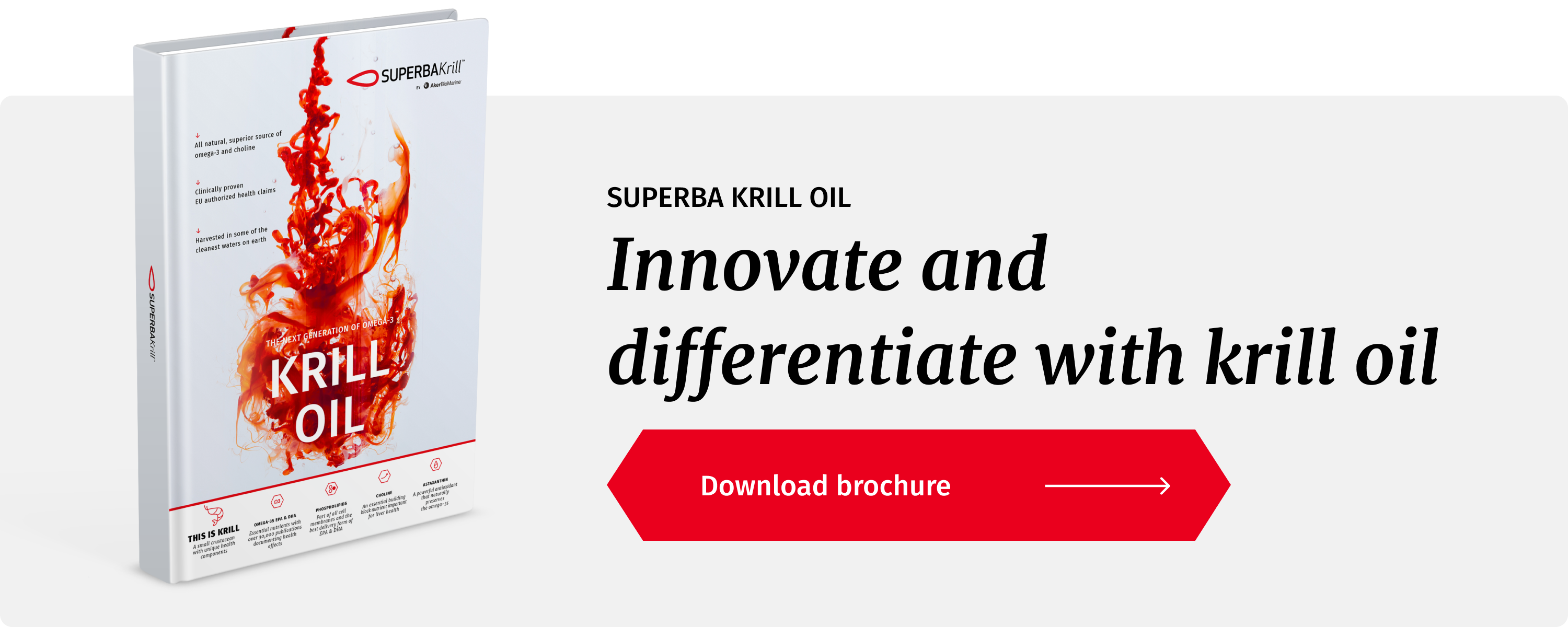Choline is an essential nutrient vital for many body functions, such as normal cellular function, nerve signaling, as well as liver and muscle functioning. The body can't make enough choline on its own, so we need to get it from our diet.
Compared to omega-3s, which were discovered almost a century ago, choline is a
newcomer to the nutritional scene. It was for the first time recognized as an essential nutrient in 1998, when a study by the Institute of Medicine in the US discovered that choline deficiency can lead to fatty liver disease and muscle damage. It took many more years for the European food safety authority (EFSA) to include it in their recommendations, which happened in 2016.
Still, choline remains under the radar for most of us. Even some health care professionals don’t regularly communicate the importance of choline for good health.
This is beginning to change, though, as choline is finally stepping out of the shadows to assume its rightful place in the world of nutrition, and choline has now been included in the Nordic nutrient recommendations.
Numerous studies have been done on choline, and we’re here to give you only what you need to know: Why is choline so important for your health, what are the most important sources and what happens if you don't get enough?
Read more: Choline, an important, yet underrated nutrient
Why do you need choline? What are the health benefits?
First of all, choline is a vitamin-like essential nutrient, important for normal cellular function. It is
crucial for maintaining the structural integrity of all the cell membranes in our body. Our cell membranes are built up of choline-containing phospholipids, and without them, our cells would have no shape, and no function.
Choline is vital to three areas of health, at all ages and stages of life.
BrainCholine is a critical component of the neurotransmitter acetylcholine, (one of the brain's chemical messengers), which is important for storing memories and sending signals to the muscles to make them contract. Choline has been shown to positively impact brain function. Not getting the recommended daily amount of choline in your diet may play a role in decreased cognition and memory with age.
LiverCholine helps remove fat from your liver. This prevents nonalcoholic fatty liver disease (NAFLD). According to the Mayo Clinic, NAFLD affects an estimated 80 million to 100 million Americans. In Europe, it’s the fastest growing health epidemic, affecting 1 in 4 people.
HeartCholine is instrumental in supporting the nerve impulse systems that promote a strong heart muscle and regular heartbeat. Choline helps to keep your heart and blood vessels healthy, in part by helping to reduce blood pressure. It also has an important role in regulating homocysteine levels in the heart which, if rise too high, can have negative effects on your heart.
So to sum up, choline is particularly important for liver health, brain function and heart health in addition to being a vital component for all the cells in our body.
Key takeaway: You need to obtain the recommended daily amount of choline to stay healthy.
Important during pregnancy and breastfeeding
The importance of ensuring adequate choline intake during pregnancy and breast feeding is increasingly recognized. The European health authority, EFSA, recently published a positive scientific opinion regarding choline’s contribution to normal fetal and infant development, especially of the liver. During pregnancy and lactation, the demand for choline increases for fetal liver function and brain development. Interestingly, blood choline concentrations are significantly increased in fetuses and newborns compared to in adults, highlighting the importance of this nutrient for fetal and newborn’s health. The placenta serves as a storage reserve for choline during pregnancy, ensuring the supply to the developing fetus. However, it is important to note that maternal choline levels can be depleted leaving women vulnerable to choline deficiency and increasing the risk for birth defects if the choline supply is left too low over time.
Several studies have highlighted the importance of choline for brain development of the fetus and breastfeeding infant. For example, according to a 2019 study, supplementing the maternal diet with additional choline was shown to improve offspring cognition, neurodevelopment and placental functioning, as well as protecting against neural and metabolic insults.
Key takeaway: Choline is crucially important for a healthy brain and strong memory. It helps keep your heart in check, may help prevent fatty liver disease and may even help you perform at your peak during exercise.
Read more: Why is choline an important nutrient for human health?
Where can you get choline from your diet?
Although the body produces a small amount of choline on its own, we need to obtain the rest from our diets in order to help us meet optimal levels and maintain good health.
Choline is naturally found in foods such as …
- Eggs (egg yolks are the most concentrated food source of choline)
- Milk
- Beef and chicken liver
- High-quality wild-caught fish and shellfish (tuna, salmon, scallop)
- Cod
- Soybeans
- Broccoli
- Brussels sprouts
- Peanut butter
- Chocolate
Do you get enough choline?
Probably not.
Specifically, the National Health and Nutrition Examination Survey in 2003-2004 has concluded that 90% of the adult American population has an inadequate intake of choline, and comparable estimated mean choline intakes have been reported from later surveys. Studies show that the European population is not consuming enough choline either.
These days, both Americans and Europeans are eating less foods that offer the richest sources of choline – liver, eggs, and a variety of meats. The adequate daily intake level for choline has been set at 550 mg for men and 425 mg/day for women in the US. However, actual daily intakes are considerably lower.
What happens if you don’t get enough of choline in your diet?
Choline deficiency is found to have an impact on diseases like atherosclerosis, fatty liver disease and liver dysfunction, muscle damage and possibly also neurological disorders. Without adequate choline, liver fat may accumulate, eventually leading to steatosis and potentially to liver damage.
According to a study published in the American Journal of Clinical Nutrition, low intakes of choline may predispose us to impaired cognitive function, particularly memory loss and Alzheimer’s Disease.
The Council for Responsible Nutrition International recently published its Conference Report "Advancing Nutrition science to meet evolving global health needs". This report explores the role of nutrition in optimizing human health, and highlights the importance of choline as a crucial essential nutrient vital for maintaining overall health.
What does different choline forms have to say for health?
In foods, choline is found as both lipid-soluble and water-soluble forms. Most of the choline in foods is present as phosphatidylcholine, which is the lipid-soluble form. The choline often used in dietary supplements, on the other hand, comes in water-soluble forms for example as choline bitartrate or choline chloride.
A study from 2019 compared the uptake and generation of metabolites from choline bitartrate and phosphatidylcholine from Superba krill oil. It found that both sources equally raised choline plasma levels, but the occurrence of choline metabolites differed between the study products. The levels of important metabolites were higher, while levels of trimethylamine N-oxide (TMAO), which is a potentially detrimental compound synthesized by the action of gut microbiota from dietary choline, were substantially lower upon intake of Superba krill oil compared to choline bitartrate. A meta-analysis of 11 studies demonstrated that elevated TMAO levels were associated with the risk of cardiovascular disease.

Generation of TMAO after a single-dose supplementation with either Choline bitartrate, Superba Boost or Fish oil (control) in healthy human subjects. Choline bitartrate: n = 12; SuperbaBoost: n = 12; fish oil: n = 6. Mödinger Y. et al. Nutrients 2019.
Key takeaway: Although choline is present in everyday foods, it can be quite difficult to consume the recommended amounts through our diets. Most people in Western countries, specifically, are not getting the recommended daily amount of choline in their diet, which can lead to health issues.
This is why it’s important to consider taking a supplement to help boost your choline levels.
Choline is a key component of krill oil, making this a smart way to get the amount of choline your body needs.
Summary
Choline is an important nutrient that is sometimes forgotten among other vitamins, but it’s actually critical for maintaining good health, beginning with pregnancy and continuing throughout life. To that end, it’s essential that you get enough choline from your diet.



